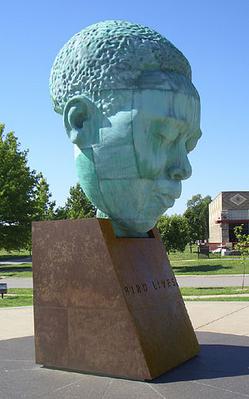Charlie Parker
Charlie Parker (August 29, 1920 – March 12, 1955), also known as "Bird," was an American jazz saxophonist and composer. Parker was a highly influential soloist and leading figure in the development of bebop, a form of jazz characterized by fast tempos, virtuosic technique, and advanced harmonies. Parker's innovative approaches to melody, rhythm, and harmony exercised enormous influence on his contemporaries and later generations of jazz musicians, making him one of the icons of jazz history.
Early Life[edit | edit source]
Charlie Parker was born in Kansas City, Kansas, and grew up in Kansas City, Missouri, an area with a vibrant jazz scene that would heavily influence his musical style. He began playing the saxophone at a young age and quickly developed a passion for jazz. Despite a lack of formal music education, Parker's natural talent and dedication to practice helped him rapidly advance his skills.
Career[edit | edit source]
Parker's career began in the early 1940s, playing with local bands in Kansas City before moving to New York City, the epicenter of the jazz world. It was in New York that Parker, along with other musicians such as Dizzy Gillespie, Thelonious Monk, and Bud Powell, would forge the complex rhythms and harmonies of bebop. Parker's performances at venues like Minton's Playhouse and the Three Deuces on 52nd Street introduced audiences to his revolutionary approach to jazz.
Parker's recording sessions from this period, including his work with the Savoy and Dial labels, produced many of his most famous compositions, such as "Ko-Ko," "Ornithology," "Yardbird Suite," and "Scrapple from the Apple." These recordings remain milestones in the history of jazz.
Personal Life and Legacy[edit | edit source]
Charlie Parker's life was marked by his genius as well as his struggles with addiction, which ultimately contributed to his early death at the age of 34. Despite his personal challenges, Parker's influence on jazz is immeasurable. He was a mentor to many younger musicians and his ideas laid the groundwork for many of the developments in jazz that followed, including cool jazz, hard bop, and free jazz.
Parker's contribution to jazz and music as a whole has been recognized by numerous awards and honors, including induction into the DownBeat Jazz Hall of Fame and a Grammy Lifetime Achievement Award.
Death[edit | edit source]
Charlie Parker died on March 12, 1955, in New York City. His death was attributed to a combination of pneumonia, a bleeding ulcer, and cirrhosis of the liver, conditions exacerbated by his long-standing substance abuse. Parker's passing was a great loss to the music world, but his legacy continues to inspire musicians and music lovers around the globe.
Discography[edit | edit source]
While a comprehensive list of Parker's recordings is beyond the scope of this article, notable albums include:
- Charlie Parker with Strings (1950)
- Bird and Diz (1950, with Dizzy Gillespie)
- The Genius of Charlie Parker series (Savoy and Dial recordings from the 1940s)
Influence[edit | edit source]
Charlie Parker's influence extends beyond jazz and into other musical genres, including classical, rock, and hip-hop. His work has been studied by musicians and composers worldwide, and his life has been the subject of numerous books, films, and musical tributes.
Search WikiMD
Ad.Tired of being Overweight? Try W8MD's physician weight loss program.
Semaglutide (Ozempic / Wegovy and Tirzepatide (Mounjaro / Zepbound) available.
Advertise on WikiMD
|
WikiMD's Wellness Encyclopedia |
| Let Food Be Thy Medicine Medicine Thy Food - Hippocrates |
Translate this page: - East Asian
中文,
日本,
한국어,
South Asian
हिन्दी,
தமிழ்,
తెలుగు,
Urdu,
ಕನ್ನಡ,
Southeast Asian
Indonesian,
Vietnamese,
Thai,
မြန်မာဘာသာ,
বাংলা
European
español,
Deutsch,
français,
Greek,
português do Brasil,
polski,
română,
русский,
Nederlands,
norsk,
svenska,
suomi,
Italian
Middle Eastern & African
عربى,
Turkish,
Persian,
Hebrew,
Afrikaans,
isiZulu,
Kiswahili,
Other
Bulgarian,
Hungarian,
Czech,
Swedish,
മലയാളം,
मराठी,
ਪੰਜਾਬੀ,
ગુજરાતી,
Portuguese,
Ukrainian
Medical Disclaimer: WikiMD is not a substitute for professional medical advice. The information on WikiMD is provided as an information resource only, may be incorrect, outdated or misleading, and is not to be used or relied on for any diagnostic or treatment purposes. Please consult your health care provider before making any healthcare decisions or for guidance about a specific medical condition. WikiMD expressly disclaims responsibility, and shall have no liability, for any damages, loss, injury, or liability whatsoever suffered as a result of your reliance on the information contained in this site. By visiting this site you agree to the foregoing terms and conditions, which may from time to time be changed or supplemented by WikiMD. If you do not agree to the foregoing terms and conditions, you should not enter or use this site. See full disclaimer.
Credits:Most images are courtesy of Wikimedia commons, and templates, categories Wikipedia, licensed under CC BY SA or similar.
Contributors: Prab R. Tumpati, MD





